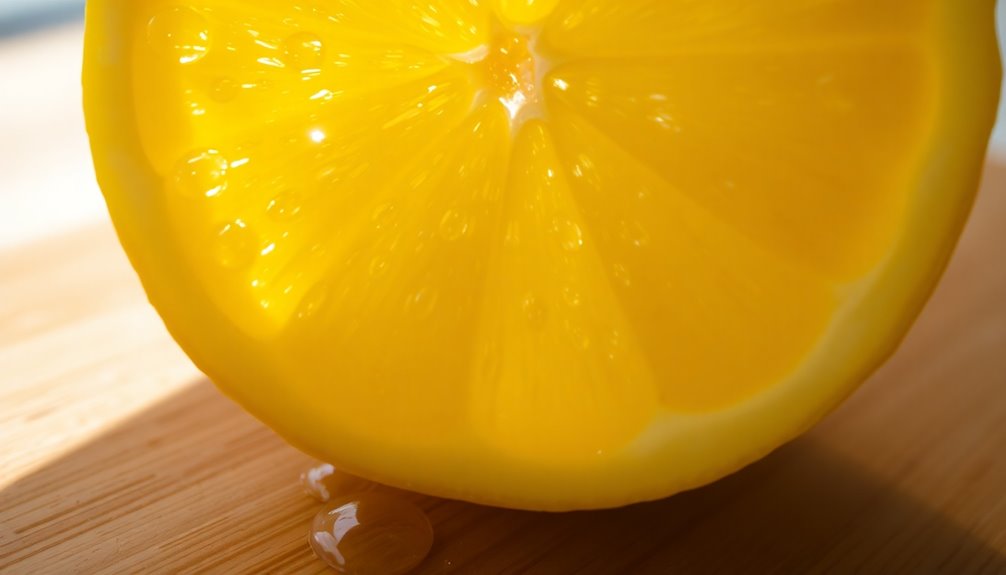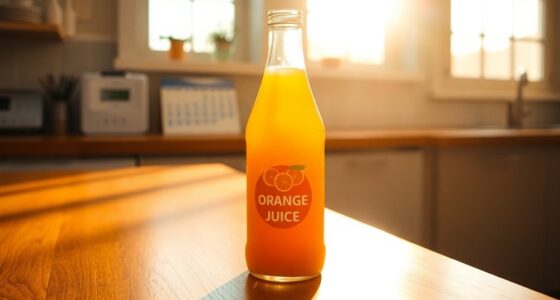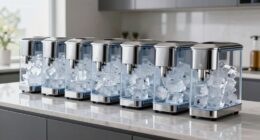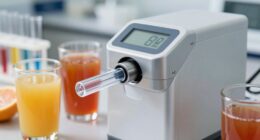The juice you get from one lemon depends on its size. A medium lemon usually yields about 3 tablespoons, while larger lemons can give you up to 4 tablespoons. Small lemons typically produce around 2 tablespoons. Remember, factors like ripeness and variety can also influence juice output. If you've got a recipe in mind, knowing how much juice to expect can really help you out. Keep going to find more tips on maximizing your lemon juice!
Key Takeaways
- A medium lemon yields about 3 tablespoons of juice.
- Larger lemons can produce up to 4 tablespoons or a quarter cup of juice.
- Small lemons typically provide around 2 tablespoons of juice.
- Juice yield can vary based on the lemon's ripeness and variety.
- Techniques like rolling or microwaving can enhance juice extraction.
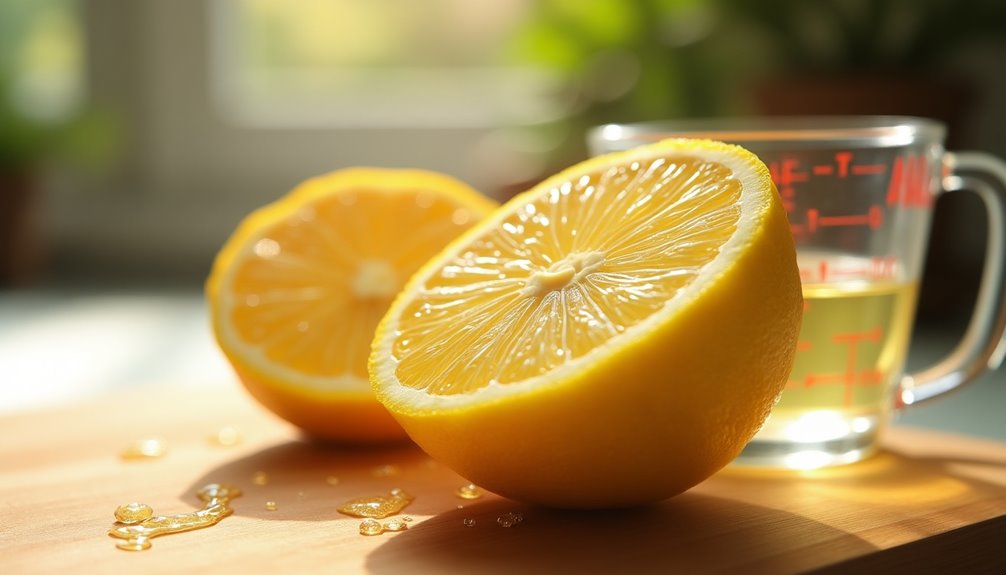
When you squeeze a medium lemon, you can expect to get about 3 tablespoons of juice, while larger lemons might yield up to 4 tablespoons, or even a quarter cup. This juicy output varies depending on the size of the lemon you use. If you're working with a small lemon, you'll likely get around 2 tablespoons of juice. So, when you're planning to use lemons for your recipes, it's crucial to consider the size of the fruit and how much juice you need.
For most recipes that call for lemon juice, the amount of juice you can extract will directly affect the flavor and overall success of your dish. If a recipe requires 1 cup of lemon juice, you'll typically need around 5 to 6 medium lemons. Knowing how much juice you can get from each lemon helps you avoid the frustration of running out mid-recipe. Imagine starting a delicious lemon vinaigrette only to find you don't have enough juice!
The juiciness of your lemon can also depend on its ripeness and variety. Some lemons are simply more juicy than others, which can be a game-changer when you're preparing a dish that relies heavily on fresh lemon juice. To enhance your juicing experience, consider trying a few techniques. Rolling the lemon on the countertop before cutting it can help break down the cell walls, making it easier to extract juice. Alternatively, microwaving the lemon for a few seconds can warm it up slightly, increasing the juice yield.
Don't forget about lemon zest, either! The zest adds a wonderful aromatic quality to your recipes and can complement the juice beautifully. Just remember, the zest is where the concentrated lemon flavor lives, so don't shy away from using both the zest and juice when crafting your culinary creations.
When you think about juiciness, it's also worth noting that lemons can vary in flavor. Some lemons are tart and bright, while others might have a sweeter undertone. This variation can affect how much juice you want to use in your dishes. You may find that a large lemon gives you a more robust flavor, while a small lemon might provide just the right touch of zestiness for a lighter dish.
Frequently Asked Questions
How Much Store-Bought Lemon Juice Equals One Lemon?
If you’re wondering how much store-bought lemon juice equals one lemon, you’re looking at about 2 to 3 tablespoons. This translates to roughly 1 to 1. 5 ounces. Keep in mind that the juice yield can vary depending on the size and ripeness of the lemon. Therefore, when asking how many ounces in one lemon, it’s important to note that a medium lemon typically produces around 1 to 2 ounces of juice. For recipes requiring precise measurements, it’s always a good idea to have a kitchen scale or measuring tools handy.
When you're using it in recipes, remember that 1 tablespoon of store-bought lemon juice typically replaces the juice from one medium lemon.
Always taste your dish, though, since bottled juice might differ slightly in flavor from fresh juice. Adjust as needed to suit your palate!
How Much Is 1 Lemon Juice?
Think of a lemon as a little sunburst of flavor in your kitchen.
When you squeeze one medium lemon, you're likely to get about 3 tablespoons of juice. If it's on the larger side, you might score up to 4 tablespoons, while a smaller lemon generally yields around 2 tablespoons.
Can I Use Bottled Lemon Juice Instead of Fresh Lemon?
You can definitely use bottled lemon juice instead of fresh lemon juice, especially when you're short on time.
Just remember that the flavor mightn't be as vibrant, and acidity levels can vary. For most recipes, you can substitute about 2 tablespoons of bottled juice for each medium lemon.
Always check the label for any added ingredients, as preservatives or sweeteners can change the taste of your dish.
Fresh juice is usually the better choice for flavor!
How Much Real Lemon Equals the Juice of One Lemon?
When you're figuring out how much real lemon juice equals the juice of one lemon, it's usually about 3 tablespoons from a medium lemon.
If you've got larger lemons, you might get up to 4 tablespoons, so you'd need fewer.
Smaller lemons, on the other hand, yield around 2 tablespoons, meaning you'd need 1.5 to 2 to match a medium.
Always have a few extra lemons just in case!
Conclusion
So, next time you squeeze a lemon, remember that you might just get about two to three tablespoons of juice. It's funny, isn't it? You start with a bright, sunny fruit, expecting a burst of flavor, but you end up with just a few spoonfuls of liquid. Life's like that too—sometimes, what looks promising only yields a little. But hey, it's those small bursts of zest that can turn an ordinary dish into something extraordinary.
Cindy thoroughly researches juicing trends, techniques, and recipes to provide readers with practical advice and inspiration. Her writing style is accessible, engaging, and designed to make complex concepts easy to understand. Cindy’s dedication to promoting the advantages of juicing shines through her work, empowering readers to make positive changes in their lives through the simple act of juicing.

